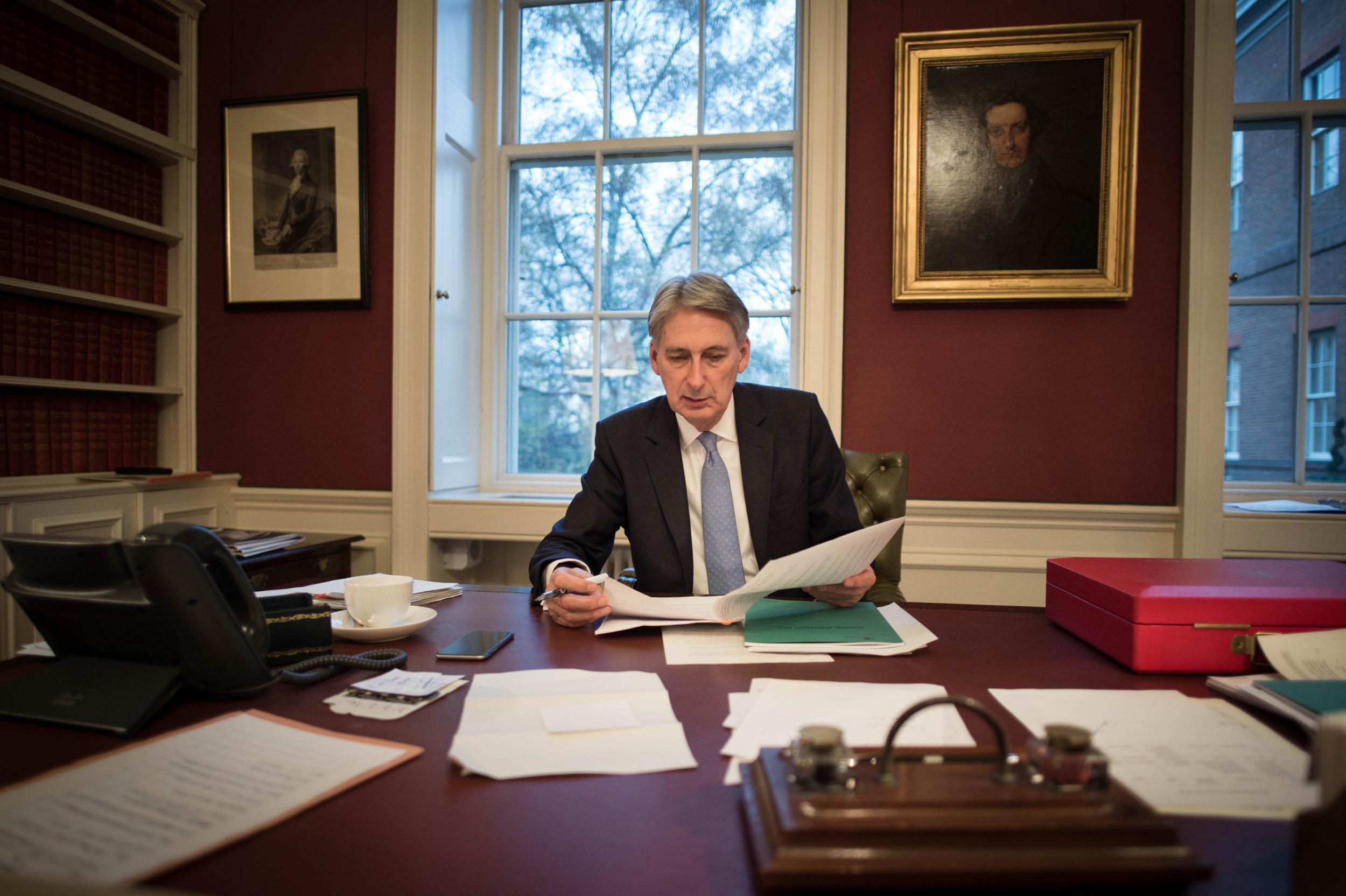Conservatives pitch for the working class with help on letting fees, benefits and housing

Philip Hammond will use his first Autumn Statement in a bid to frame the Conservative Party as a friend to “ordinary working-class people”, pledging to abolish controversial letting-agent fees for “generation rent” and easing the pain of welfare cuts.
The Chancellor is also promising a £1.4bn cash-injection for 40,000 “affordable homes” while permitting developers to use the money to build more rental properties.
Ministers hope the sweeteners, also including a rise in the minimum wage, might help distract attention from potentially explosive data exposing Brexit’s impact on the economy.
The Office for Budget Responsibility’s assessment, released alongside the Chancellor’s statement, is expected to show slower growth and rising prices, with some early reports suggesting Brexit uncertainty has blown a £100bn hole in the Treasury’s coffers.
Theresa May promised in her opening speech as Prime Minister to lead a Government for the "just about managing", a group now known as the Jams.
In the Commons today, Mr Hammond will seek to build on that promise, unveiling measures “designed to improve the living standards of ordinary working-class people and their families”.
Among them is a proposed ban on letting agents’ fees aimed at helping 4.3 million households in private rental homes.

Citizens Advice say the fees, paid as people look to secure a property, are on average £337, whilst the charity Shelter has found one in seven pay more than £500.
The policy was promised by former Labour leader Ed Miliband back in 2014, while the Liberal Democrats have also campaigned for the move.
Shadow housing minister John Healey welcomed the Government’s “change of heart”, pointing out that Ms May had voted against a similar measure while Home Secretary. Lib Dem Peer Olly Grender said her party’s “relentless campaigning had finally paid off”.
Landlords and letting agents, however, warned the costs would now be passed on to households in rising rents.
Mr Hammond believes he will have to spend upwards of £1bn up to 2020 to ease the pain of planned cuts to the Universal Credit that have even caused consternation among some Tory MPs.
He will promise to reduce the 65 per cent rate at which UC is withdrawn from people who begin to earn higher amounts, to 63 per cent.
The Treasury said three million households will benefit. A couple with two children receiving the housing element of the UC, where one parent earns £30,000 a year, would benefit by £425 annually. A single parent with one child and no housing costs earning £15,000 a year would benefit by £170.
But critics pointed out that for most claimants the change in the taper rate will not offset the broader cuts to the UC brought in by the Conservatives last year.
Shadow Chancellor John McDonnell said: “It would appear that this Autumn Statement is set to fail our first test to provide actual support for those on low and middle incomes.
“If, as reported, all the Chancellor is offering is a 2 per cent change in the taper rate, then it will be too little too late for those working families who have had to bear the brunt of six wasted years of failed Tory economic policies.”
The money for new affordable homes will form part of a broader housing package to be announced to MPs in the Commons.
Mr Hammond will also relax rules, allowing developers who previously could use government money to build housing for the Rent to Buy and Shared Ownership schemes, to also use it to build houses for the Affordable Rent initiative – which sees housing providers let homes at 80 per cent of the market rate.
It comes after Mr Hammond and Communities Secretary Sajid Javid pledged £5bn for schemes to boost housebuilding at Conservative conference.
The Government wants 200,000 new homes built each year, a target consistently missed. Just over 139,000 were completed in the year to June 2016, according to official data.
The focus on the rental market marks a shift from years of policy under former Chancellor George Osborne, aimed at boosting home-ownership, to instead trying to help those stuck paying landlords for a place to live.
Commenting on the new investment, Shelter’s chief executive Campbell Robb said it would be welcomed by Jams crying out for “genuinely affordable” homes.
He added: “We see the impact of our chronic shortage of affordable homes every day, with increasing numbers of people left with no choice but to fork out most of their hard-earned wages on expensive private rents, and wave goodbye to the chance of a stable home.
“As always, the devil will be in the detail, and we looking forward to working with the Government to make sure that this funding helps provide homes for those struggling with high housing costs.”
Mr Hammond will also announce an increase in the National Living Wage to £7.50 an hour from April 2017 and spending £4.3m each year to strengthen minimum wage enforcement.
He will then have to present the OBR’s forecasts for growth and the state of the public finances in coming years, with one report suggested the body would highlight a £100bn black hole in government finances because of low tax revenues, slower growth and reduced investment on the back of the Brexit vote.
Mr Osborne had promised the UK finances would be in surplus by 2019-20, but instead the country is now on course to be running a significant deficit by then.
Despite the negative outlook, Mr Hammond is still expected to announce tax cuts, increasing the tax-free personal allowance and raising the threshold for those paying the higher rate of income tax.
Join our commenting forum
Join thought-provoking conversations, follow other Independent readers and see their replies
Comments
Bookmark popover
Removed from bookmarks